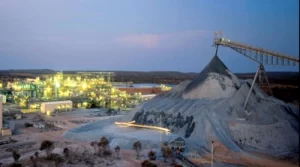
BHP Group Ltd on Wednesday said it remains committed to growing its portfolio of copper and nickel projects but is not interested in the lithium market, which it believes is well supplied.
The comments echo those the world’s largest mining company made in the past year and come as lithium prices have been sliding amid demand worries. Analysts are expecting lithium prices to plunge by 25% in total this year, largely due to an expected slowdown in China’s EV market as government subsidies wane.
“We still don’t see the demand-supply equation of lithium to be as fundamental as copper and nickel,” Sonia Scarselli of BHP Xlpor, the company’s division that invests in junior mining companies, told Reuters on the sidelines of the Prospectors and Developers Association of Canada (PDAC) mining conference in Toronto. “For us, lithium will remain flat.”
The bet is a bit of a counterintuitive one among BHP’s global mining peers. Rio Tinto Ltd, for example, paid $825 million in late 2021 for a lithium project in Argentina and is trying to build a lithium mine in Serbia.
Glencore Plc is the second-largest shareholder in Li-Cycle Holdings Corp, a recycler set to become one of the largest US lithium producers by next year. And Sibanye Stillwater Ltd has agreed to help ioneer Ltd develop a Nevada lithium project.
BHP expects global copper and nickel supplies to remain below demand as few new mines for either metal are coming online in the near future.
The company has invested $500,000 each in Nordic Nickel Ltd, Tutume Metals, Asian Battery Minerals, Impact Minerals Ltd, Red Ox Copper, Bronzite Corp, Kingsrose Mining Ltd, each of which are exploring nickel and copper deposits across the globe.
BHP last year also invested $40 million in Kabanga Nickel, which is developing a nickel mine in Tanzania, and is helping Rio to develop the massive Resolution Copper mining project in Arizona.
The Kabanga investment, BHP’s first in Africa since 2015, was part of what chief executive Mike Henry described as a willingness to move into “tougher jurisdictions.” That move came after BHP lost out on a 2021 bid to buy Canadian junior nickel miner Noront Resources.
Elsewhere, BHP has committed to invest C$12 billion ($8.7 billion) to build a potash mine in Canada’s Saskatchewan province as global population growth fuels greater demand for the fertilizer.
Supply interruptions from Belarus and Russia, the two largest potash producers, make Canada well positioned” to fill the supply gap, Rad Udd, president of BHP Americas, said in an interview.
